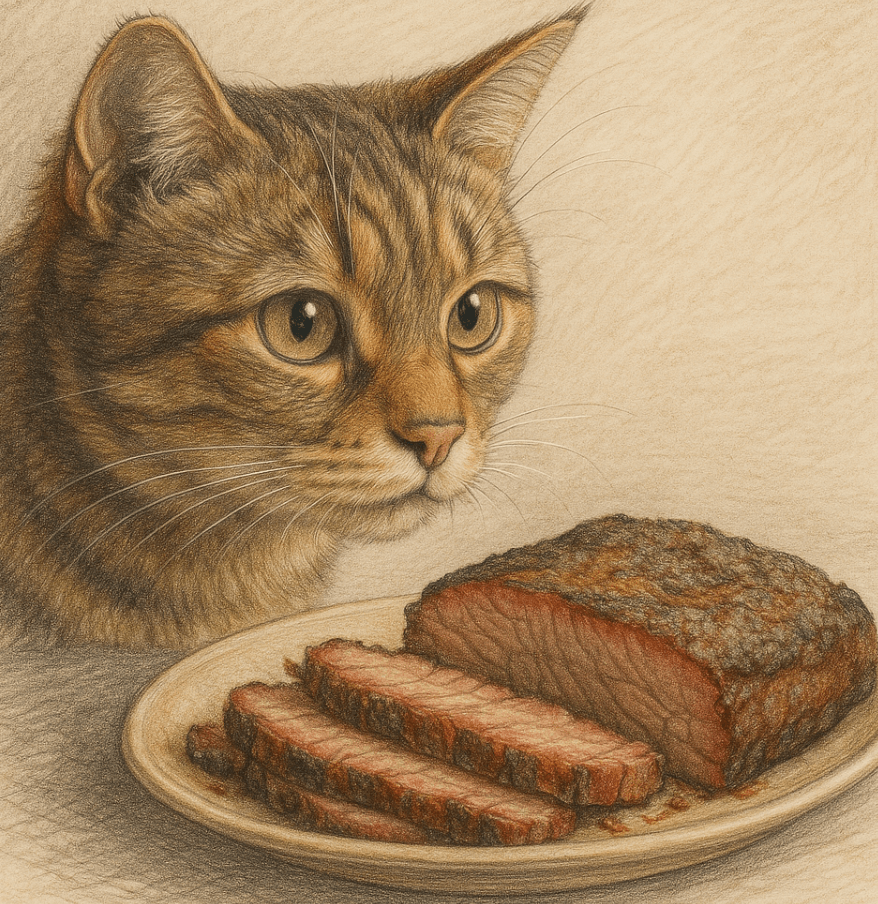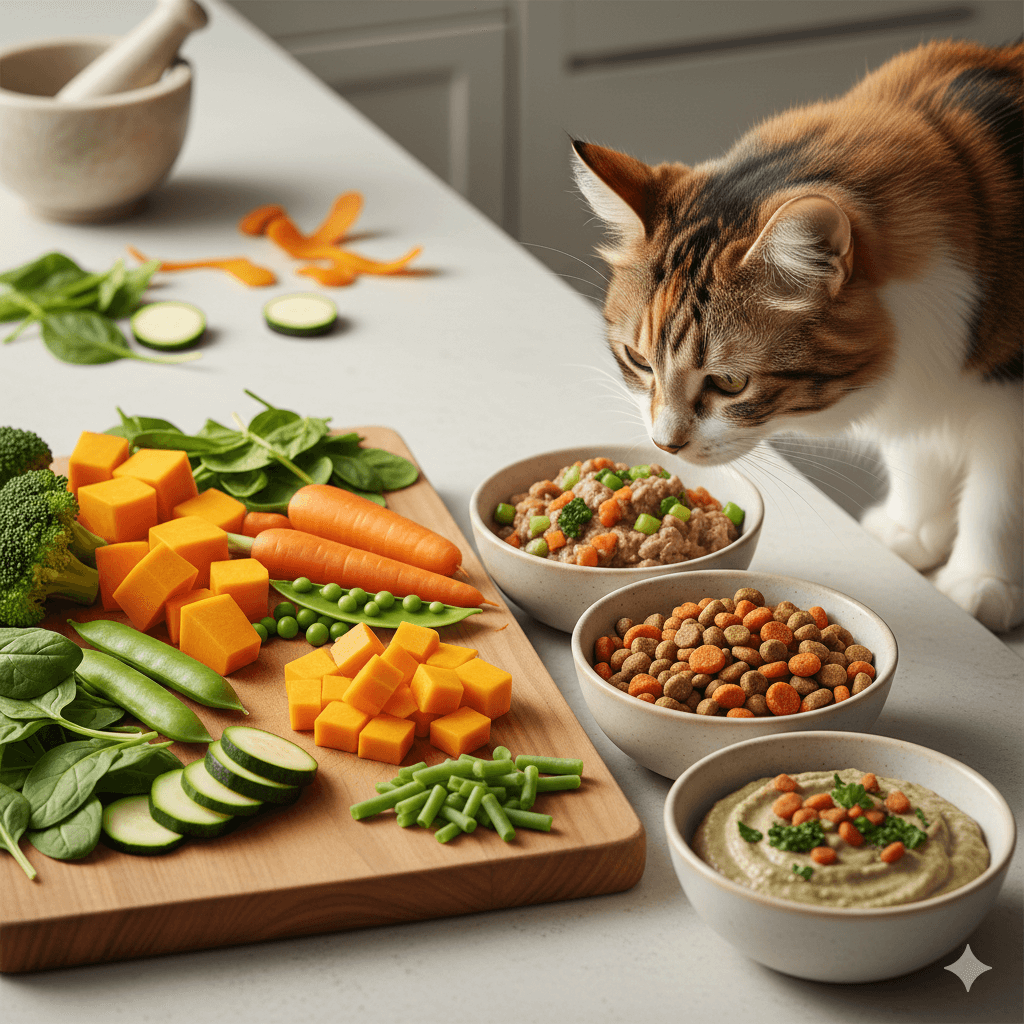Can Cats Eat Brisket?
When it comes to feeding our feline friends, many pet owners wonder whether human foods like brisket are safe for cats. Brisket, a flavorful cut of beef often enjoyed by humans, might seem like a tempting treat to share with your cat. However, cats have unique dietary needs as obligate carnivores, and not all meats are suitable for them. While brisket can offer some nutritional benefits, there are important considerations to keep in mind before offering it to your furry companion. In this blog post, we’ll explore everything you need to know about cats and brisket, including potential risks, safe preparation methods, and healthier alternatives.
Potential Risks of Feeding Brisket to Cats
While brisket is meat, which aligns with a cat’s natural diet, it also poses certain risks that every pet owner should be aware of. These hazards can range from digestive upset to more serious health issues if not handled properly.
High Fat Content:
Brisket is often fatty, and excessive fat can lead to pancreatitis or obesity in cats, both of which are serious health concerns.Seasonings and Spices:
Many brisket recipes include garlic, onions, or other seasonings that are toxic to cats and can cause gastrointestinal distress or anemia.Salt Overload:
Brisket is often cooked with high levels of salt, which can dehydrate your cat and lead to sodium ion poisoning if consumed in large amounts.Bone Fragments:
If the brisket contains bones, small fragments can splinter and cause choking, intestinal blockages, or internal injuries.Cooked vs. Raw Debate:
Cooked brisket loses some of its nutritional value, while raw brisket carries the risk of bacterial contamination like Salmonella or E. coli.
These risks highlight why caution is essential when considering giving brisket to your cat. Always prioritize their safety over indulgence.
Benefits of Brisket for Cats (When Prepared Safely)
Despite the risks, lean portions of brisket can offer some nutritional benefits for cats when prepared and served appropriately. These advantages are rooted in their natural dietary needs as obligate carnivores.
High-Quality Protein:
Brisket is rich in protein, which supports muscle development, energy production, and overall vitality in cats.Essential Amino Acids:
Beef contains taurine, an amino acid crucial for heart health, vision, and immune function in cats.Iron Content:
Brisket provides iron, which helps maintain healthy red blood cells and prevents anemia in cats.Variety in Diet:
Offering small amounts of plain, cooked brisket can add variety to your cat’s diet without disrupting their nutritional balance.Mental Stimulation:
Introducing new textures and flavors can engage your cat’s senses and provide mental enrichment.
While these benefits exist, they must be weighed against the potential dangers to determine if brisket is truly suitable for your cat.
Check this guide 👉Can Cats Eat Lychee? Best 7 Expert Tips!
Check this guide 👉Can Cats Eat Durian? Best 7 Expert Tips!
Check this guide 👉Can Cats Eat Matcha? Best 7 Expert Tips!

Safe Alternatives to Brisket | Risks of Unsafe Meat Choices |
|---|---|
Plain, cooked chicken breast | Fatty cuts like pork belly or lamb ribs |
Lean ground turkey | Processed meats like bacon or sausage |
Boneless, skinless fish | Meat with added spices or seasonings |
Commercially prepared cat treats | Raw or undercooked meats |
Freeze-dried meat snacks | Meat with visible fat or gristle |
How to Safely Feed Brisket to Your Cat
If you decide to give your cat a taste of brisket, it’s essential to take precautions to minimize risks. Follow these guidelines to ensure a safe experience.
Choose Lean Portions:
Trim off any visible fat or gristle to reduce the risk of digestive upset or pancreatitis.Avoid Seasonings:
Serve only plain, unseasoned brisket to prevent exposure to harmful ingredients like garlic or onion powder.Cook Thoroughly:
Ensure the brisket is fully cooked to eliminate the risk of bacterial contamination from raw meat.Cut into Small Pieces:
Slice the brisket into bite-sized pieces to prevent choking or difficulty swallowing.Offer in Moderation:
Limit brisket to an occasional treat rather than a regular part of their diet to avoid nutritional imbalances.
By following these steps, you can mitigate risks while allowing your cat to enjoy the occasional brisket treat safely.
Signs Your Cat May Be Struggling After Eating Brisket
Even with precautions, complications can arise if your cat consumes brisket improperly. Watch for these warning signs to act quickly if something goes wrong.
Vomiting or Diarrhea:
These symptoms may indicate that your cat has ingested too much fat or seasoning, leading to digestive upset.Lethargy or Weakness:
A sudden lack of energy could signal dehydration or a more serious issue like sodium ion poisoning.Excessive Drooling:
Drooling could indicate irritation or injury caused by sharp bone fragments or spicy seasonings.Difficulty Breathing:
Choking or respiratory distress may occur if bone fragments become lodged in their throat or airway.Loss of Appetite:
Refusal to eat may suggest discomfort, nausea, or an underlying health issue triggered by the brisket.
Recognizing these signs early allows you to seek veterinary care promptly, preventing further complications.
Common Mistakes to Avoid When Feeding Brisket
Feeding brisket to your cat requires careful consideration to avoid mistakes that could endanger their health. Here are some pitfalls to watch out for.
Offering Fatty Cuts:
High-fat portions can lead to pancreatitis or obesity, which are serious health concerns for cats.Ignoring Seasonings:
Even small amounts of garlic, onion, or salt can be toxic, so always serve plain brisket.Giving Large Portions:
Overfeeding brisket disrupts your cat’s balanced diet and increases the risk of digestive issues.Leaving Bones In:
Bone fragments can splinter and cause choking, blockages, or internal injuries.Neglecting Veterinary Advice:
Skipping a professional opinion can result in unknowingly harming your cat with inappropriate food choices.
Avoiding these mistakes ensures a safer and healthier experience for your cat.
Alternatives That Mimic the Benefits of Brisket
If you’re hesitant about feeding brisket, there are plenty of alternatives that mimic its benefits without the associated risks.
Plain Cooked Chicken:
A lean, protein-rich option that’s easy to digest and safe for cats.Freeze-Dried Beef Treats:
Specially formulated treats provide the flavor of beef without the fat or seasonings.Commercial Cat Food with Beef Flavor:
High-quality wet or dry food ensures balanced nutrition while satisfying your cat’s cravings.Bone Broth (Unsalted):
A hydrating and flavorful option that offers nutrients without the risks of solid meat.Edible Cat Chews:
Designed for feline teeth, these chews promote dental health and provide mental stimulation.
These alternatives allow you to cater to your cat’s instincts while keeping them safe.
Understanding Your Cat’s Natural Instincts Around Meat
Cats are naturally drawn to meat because of their evolutionary history as hunters. Understanding their instincts helps explain their fascination.
Obligate Carnivores:
Cats require animal-based proteins to thrive, making meat an essential part of their diet.Teething and Chewing Needs:
Kittens and young cats chew on objects to relieve teething discomfort, making meat appealing.Nutrient Seeking:
Cats crave amino acids like taurine, which are found in meat and vital for their growth and development.Playful Exploration:
Cats use their mouths to explore new textures, and meat provides an intriguing sensory experience.Territorial Marking:
Chewing and gnawing on objects like meat can serve as a way for cats to assert ownership or relieve stress.
By recognizing these behaviors, you can better address your cat’s needs in a safe and controlled manner.
Frequently Asked Questions About Cats and Brisket
Can cats eat smoked brisket?
No, smoked brisket often contains harmful seasonings, excessive salt, and preservatives that can harm your cat.
Is raw brisket safe for cats?
Raw brisket carries the risk of bacterial contamination and should be avoided unless specifically recommended by a vet.
How much brisket can I give my cat?
Limit brisket to small, bite-sized pieces no more than once or twice a month to avoid nutritional imbalances.
What should I do if my cat eats seasoned brisket?
Monitor them closely for symptoms of toxicity, such as vomiting or lethargy, and contact your vet immediately if needed.
Are there healthier meat options for cats?
Yes, plain cooked chicken, turkey, or commercially prepared cat treats are safer and more nutritious alternatives.
Prioritizing Your Cat’s Health When It Comes to Brisket
Feeding brisket to your cat can be a double-edged sword, offering both nutritional benefits and potential risks. While lean, plain brisket can provide a protein-rich treat, improper preparation or overindulgence can lead to serious health issues. By understanding the dos and don’ts of feeding brisket, choosing safer alternatives, and consulting your veterinarian, you can ensure your cat stays healthy and happy. Remember, your feline friend relies on you to make the best dietary choices for them—so always prioritize their well-being above all else.
Can a Cat Be Tested for Rabies? Best 7 Expert Tips! – Learn if testing is possible, understand the process, and discover prevention tips to keep your cat safe from rabies.
Can a Dog Be Tested for Rabies? Best 7 Expert Tips! – Learn how rabies testing works, why it’s critical, and what every dog owner needs to know.
Best Vegetables for Cat Food: Best 7 Expert Tips! – Discover safe, nutritious veggies to boost your cat’s diet, support digestion, and enhance overall health naturally.
Best Vegetables for Dog Food: Best 7 Expert Tips! – Discover safe, nutritious veggies to boost your dog’s diet, support digestion, and enhance overall health naturally.




